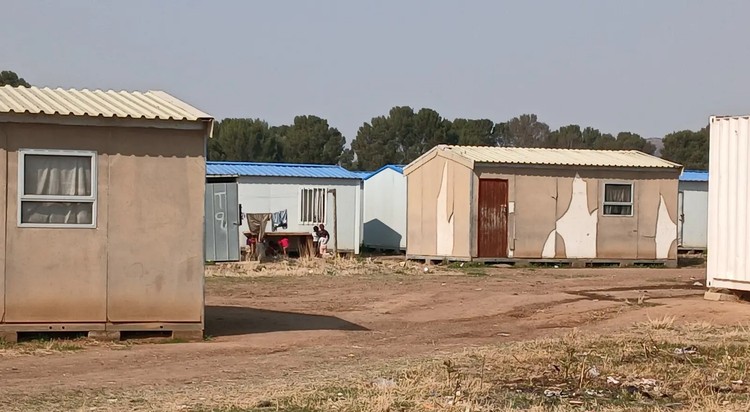Eastern Cape families affected by 2023 floods to wait until next year for houses
Huge housing project launched before the floods is still in initial phase
Families living in temporary houses in Komani in the Eastern Cape will have to wait at least until 2027-8 to be rehoused. Photo: Nombulelo Damba-Hendrik
- Hundreds of families in Komani, Eastern Cape, displaced by floods in 2023 are still waiting for their promised houses.
- They are living in dilapidated, leaking temporary accommodation with no electricity and limited water and sanitation.
- Meanwhile a huge housing project launched before the floods is still in the initial phase.
Construction has still not started on a huge Eastern Cape housing project launched in 2023. Meanwhile families affected by floods later in 2023 are still waiting for their promised houses.
More than 500 households in Silvertown and Gauteng informal settlements in Komani were hit by floods in February 2023. At least three people were confirmed dead and about 420 families were moved to temporary shelters.
Two years later they are still living in their temporary houses, many of which are dilapidated and leak.
Eastern Cape Department of Human Settlement spokesperson Yanga Funani told GroundUp the affected families would get permanent housing in the 3,000-unit New Rathwick housing project. He said the project, which had already been launched at the time of the floods, was still in the initial phase - the Environmental Impact Assessment (EIA).
Construction was due to start in 2027/28, he said.
Funani did not respond to questions from GroundUp about why the first phase was taking so long.
Meanwhile many of the temporary houses, near the Luvuyo Lerumo High School, have broken walls and leaking roofs. The area has no electricity and according to residents crime is very high, especially at night.
Each toilet is shared by five families. Residents have to fetch water from a water tank and carry the bucket to flush the toilet.
Residents said the toilets often get full and the municipality takes a long to empty them.
Chris Hani District Municipality spokesperson Thobeka Mqamelo said the 106 toilets were emptied every two to three months. She said foreign objects like dead animals, garbage, and stones were thrown into the septic tanks, blocking the toilet system.
But community leader Lelethu Mfaku said when they call the municipality to empty the toilet, they are often told to wait because there’s only one vacuum tanker that services the whole Chris Hani District. She said they sometimes waited months until the tanker came.
There are 16 water tanks but according to Mqamelo two have been stolen and one has been damaged by wind. Mfaku said the tanks are filled twice a week, but families still run out of water.
“To charge our phones we need to go to another area. There are no street lights here, crime is worse and the sad thing is that it seems like our officials have forgotten about us.”
Resident Noxolo Maphipha shares a one-room temporary house with her adult son. She cooks outside using wood and uses a candle for lighting at night.
“When I need to relieve myself, I first go get water from the tank then go down to the toilet. As you can see, both the water tank and the toilets are far from my house,” she said.
She has put large stones on her roof and a wooden support for the wall, which she says shakes in the wind.
Some flood victims were left behind in Gauteng informal settlement. Resident Similo Wambi, who moved to the area in 2008, says there are no toilets and families use an open field. They get water from the river or the taxi rank.
Since the floods “not a single official has come to check on us”, said Wambi.
Support independent journalism
Donate using Payfast

Don't miss out on the latest news
We respect your privacy, and promise we won't spam you.
Next: We’re being pushed out, say Kalk Bay fishing families
Previous: Lesotho families, moved to make way for a dam, lose court battle
© 2025 GroundUp. This article is licensed under a Creative Commons Attribution-NoDerivatives 4.0 International License.
You may republish this article, so long as you credit the authors and GroundUp, and do not change the text. Please include a link back to the original article.
We put an invisible pixel in the article so that we can count traffic to republishers. All analytics tools are solely on our servers. We do not give our logs to any third party. Logs are deleted after two weeks. We do not use any IP address identifying information except to count regional traffic. We are solely interested in counting hits, not tracking users. If you republish, please do not delete the invisible pixel.

